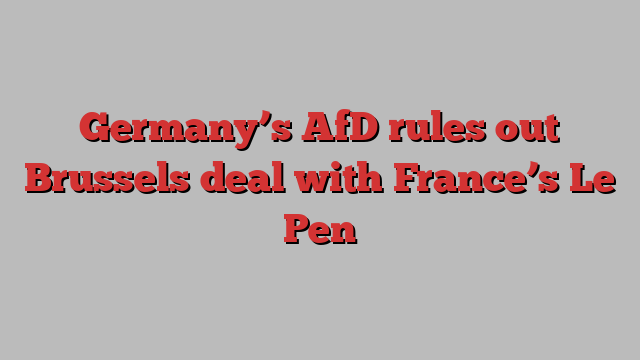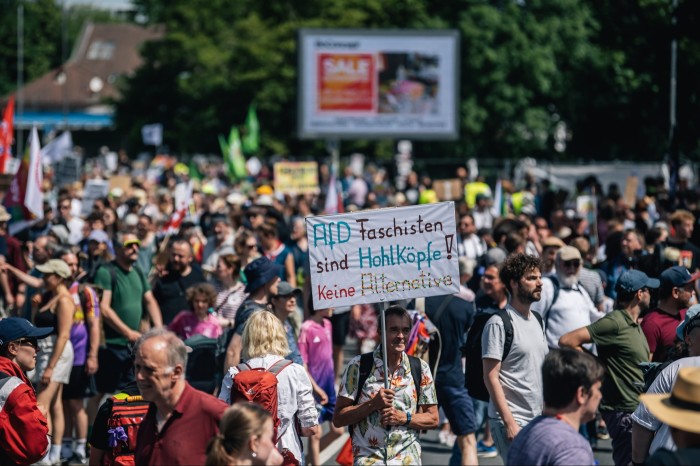
Unlock the Editor’s Digest for free
Roula Khalaf, Editor of the FT, selects her favourite stories in this weekly newsletter.
The leader of the far-right Alternative for Germany has little hope of healing the party’s rift with France’s Marine Le Pen but is confident of finding new allies and ending the AfD’s isolation in Europe, she said.
Alice Weidel told the Financial Times that the AfD was “looking for new partners and trying to form our own group” in the European parliament. Working with the Rassemblement National party was now “out of the question”, she said, although she had “no hard feelings” towards Le Pen.
She is “keeping her fingers crossed” that the RN will win the French parliamentary election — the first round is being held on Sunday — and that its leader Jordan Bardella will become “France’s youngest prime minister”. “That would be a wonderful result,” she said.
Weidel was speaking shortly after being re-elected as AfD co-leader at the party’s annual conference in the west German city of Essen this weekend.
The event was overshadowed by mass protests as thousands of Germans converged on Essen to express their opposition to a party they see as pro-Russian, xenophobic and anti-democratic.
Organisers said some 70,000 people took part in the protests. Angry demonstrators sought to prevent AfD delegates and journalists from entering the conference venue. Local media said two policemen were attacked and injured as they tried to escort a politician through a group of protesters.

Although it has been designated a suspected extreme rightwing organisation by German domestic intelligence, the AfD is the most successful far-right party in Germany since the Second World War. It scored 15.9 per cent in this month’s European elections, its best ever result in a nationwide vote.
But for months it has been dogged by controversy. Late last year it emerged that party functionaries had met with a notorious white supremacist ideologue to discuss plans to deport millions of foreigners, even those with German passports. That triggered huge demonstrations against the far-right in dozens of German towns and cities.
Its leading candidate for the European elections became embroiled in a series of scandals. Maximilian Krah, an MEP, faced questions about his ties to China after one of his staffers was arrested on suspicion of spying for Beijing. Then he sparked outrage by saying that not everyone who served in the SS, the paramilitary organisation central to Adolf Hitler’s Nazi regime, was a criminal.
In response, Le Pen’s Rassemblement National kicked the AfD out of “Identity and Democracy”, a far-right grouping in the European parliament, saying it could no longer work with its erstwhile German ally.
Weidel acknowledged that the SS interview was “the straw that broke the camel’s back”. “The frustration with our party just became too great,” she said.
She added that Krah’s gaffes and legal problems were one reason why the AfD had not done as well as many had predicted in the European elections. Late last year it was polling at 23 to 24 per cent, way ahead of all the parties in chancellor Olaf Scholz’s three-way coalition.
In her speech to the conference, she admitted the campaign had been “turbulent”. “It was a bumpy ride, we had some God-almighty rows,” she told delegates.
Her co-leader Tino Chrupalla said that in future the party “must look a lot more closely” at its candidates.
Weidel told the FT that frustration within her party about the conduct of the campaign was one of the reasons why she was re-elected leader with only 80 per cent of the vote, compared to 83 per cent for Chrupalla.
She said the party must “accept” its exclusion from ID, adding there was “no way back” into the grouping. But it remains on friendly terms with two parties in ID: Austria’s FPÖ and the Vlaams Belang of Belgium.
She said her “favoured scenario” would be for Le Pen’s party to leave ID and form a new group, possibly with Viktor Orbán’s Fidesz and Matteo Salvini’s Lega. That would provide the AfD with the opportunity to resume co-operation with the parties left behind in the ID.
She said the AfD would not form an alliance with other far-right parties in the parliament “just to be in a group”. “In that case we’d prefer to just stay on our own,” she said.
In a speech to the conference she set out her conditions for co-operation with other parties. They would have to accept that the AfD was opposed to the “redistribution of taxpayers’ money to Europe’s indebted states” and “our national wealth being chucked out of the window for Europe’s von der Leyens and Melonis”.
Potential partners would also have to accept that “Ukraine doesn’t belong to the EU and doesn’t belong to Europe”, she said.